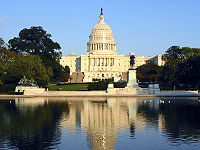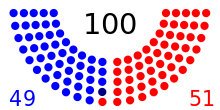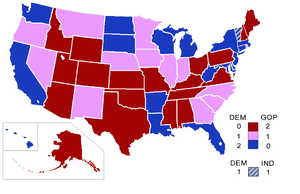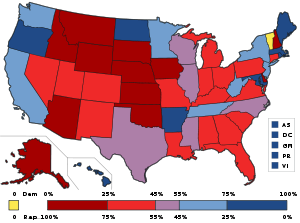- 108th United States Congress
-
108th United States Congress 
United States Capitol (2002)Duration: January 3, 2003 – January 3, 2005 Senate President: Dick Cheney (R) Senate Pres. pro tem: Ted Stevens (R) House Speaker: Dennis Hastert (R) Members: 100 Senators
435 Representatives
5 Non-voting membersSenate Majority: Republican Party House Majority: Republican Party Sessions 1st: January 7, 2003 – December 8, 2003
2nd: January 20, 2004 – December 9, 2004<107th 109th> The One Hundred Eighth United States Congress was the legislative branch of the United States federal government, composed of the United States Senate and the United States House of Representatives from January 3, 2003 to January 3, 2005, during the third and fourth years of George W. Bush's presidency.
House members were elected in the 2002 general election on November 5, 2002. Senators were elected in three classes in the 1998 general election on November 3, 1998, 2000 general election on November 7, 2000, or 2002 general election on November 5, 2002. The apportionment of seats in the House of Representatives was based on the Twenty-second Census of the United States in 2000. Both chambers had a Republican majority.
Major events
- February 1, 2003: Space Shuttle Columbia disintegrated during reentry
- March 20, 2003: 2003 invasion of Iraq began
- April 14, 2003: Human Genome Project was completed
- July 14, 2003: CIA leak scandal began
- June 16, 2003: 9/11 Commission issued an initial report of its findings
- May 17, 2004: Same-sex marriage began in Massachusetts
- November 2, 2004: United States presidential election, 2004: George W. Bush defeated Senator John Kerry. United States Senate elections, 2004 & United States House of Representatives elections, 2004: Republicans increased their majorities in both houses.
Major legislation
Enacted
Main article: List of United States federal legislation- 2003-03-11 — Do-Not-Call Implementation Act of 2003, Pub.L. 108-10, 117 Stat. 557
- 2003-04-30 — PROTECT (Prosecutorial Remedies and Other Tools to end the Exploitation of Children Today) Act, including Illicit Drug Anti-Proliferation Act, Pub.L. 108-21, 117 Stat. 650
- 2003-05-28 — Jobs and Growth Tax Relief Reconciliation Act of 2003, Pub.L. 108-27, 117 Stat. 752
- 2003-09-04 — Prison Rape Elimination Act of 2003, Pub.L. 108-79, 117 Stat. 972
- 2003-10-28 — Check 21 Act, Pub.L. 108-100, 117 Stat. 1177
- 2003-11-05 — Partial-Birth Abortion Ban Act, Pub.L. 108-105, 117 Stat. 1201
- 2003-11-25 — Medicare Prescription Drug, Improvement, and Modernization Act, Pub.L. 108-173, 117 Stat. 2066
- 2003-12-04 — Fair and Accurate Credit Transactions Act, Pub.L. 108-159, 117 Stat. 1952
- 2003-12-12 — Syria Accountability and Lebanese Sovereignty Restoration Act, Pub.L. 108-175, 117 Stat. 2481
- 2003-12-16 — CAN-SPAM Act, Pub.L. 108-187, 117 Stat. 2699
- 2004-03-25 — Unborn Victims of Violence Act (Laci and Conner's Law), Pub.L. 108-212, 118 Stat. 567
- 2004-06-30 — Bunning-Bereuter-Blumenauer Flood Insurance Reform Act, Pub.L. 108-264, 118 Stat. 711
- 2004-07-07 — GAO Human Capital Reform Act of 2004, Pub.L. 108-271, 118 Stat. 811
- 2004-10-16 — Global Anti-Semitism Review Act, Pub.L. 108-332, 118 Stat. 1282
- 2004-10-18 — North Korean Human Rights Act of 2004, Pub.L. 108-333, 118 Stat. 1287
- 2004-10-20 — Belarus Democracy Act of 2004, Pub.L. 108-347, 118 Stat. 1383
- 2004-12-17 — Intelligence Reform and Terrorism Prevention Act, Pub.L. 108-458, 118 Stat. 3637
Proposed, but not enacted
Party summary
Senate
 Party standings in the 108th Congress
Party standings in the 108th Congress 48 Democratic Senators1 Independent Senator, caucusing with Democrats51 Republican Senators
48 Democratic Senators1 Independent Senator, caucusing with Democrats51 Republican SenatorsThe party summary for the Senate remained the same during the entire 108th Congress.
Affiliation Party (Shading indicates majority caucus)Total Republican Democratic Independent Independence (MN) Vacant End of previous Congress 50 48 1 1 100 0 Begin 51 48 1 0 100 0 Final voting share 51% 49% Beginning of the next Congress 55 44 1 0 100 0 House of Representatives
Due to resignations and special elections, Republicans lost a net of two seats to the Democrats. All seats were filled though special elections. (See Changes in membership, below.)
Affiliation Party (Shading indicates majority caucus)Total Republican Independent Democratic Vacant End of previous Congress 222 1 209 433 2 Begin 229 1 205 435 0 May 31, 2003 228 434 1 June 5, 2003 229 435 0 December 9, 2003 228 434 1 January 20, 2004 227 433 2 February 17, 2004 206 434 1 June 1, 2004 207 435 0 June 9, 2004 206 434 1 July 20, 2004 207 435 0 August 31, 2004 226 434 1 September 23, 2004 225 433 2 Final voting share 52.0% 48.0% Non-voting members 1 0 4 5 0 Beginning of next Congress 232 1 201 434 1 Leadership
Senate
- President of the Senate: Dick Cheney (R)
- President pro tempore: Ted Stevens (R)
- President pro tempore emeritus: Robert Byrd (D)
Majority (Republican) leadership
Minority (Democratic) leadership
House of Representatives
- Speaker: Dennis Hastert (R)
Majority (Republican) leadership
Minority (Democratic) leadership
Members
Senate
House of Representatives
The names of members of the House of Representatives are preceded by the district number.
Changes in membership
Members who came and left during this Congress.
Senate
No changes occurred.
House of Representatives
District Vacator Reason for change Successor Date of successor's
installationHawaii 2nd Vacant Patsy Mink had been elected to this seat posthumously. Ed Case had already won Mink's seat in the 107th Congress. Ed Case (D) January 4, 2003 Texas 19th Larry Combest (R) Resigned May 31, 2003 for personal reasons. A special election was held June 3, 2003. Randy Neugebauer (R) June 5, 2003 Texas 4th Ralph Hall (D) Changed political parties Ralph Hall (R) January 5, 2004 Kentucky 6th Ernie Fletcher (R) Resigned December 9, 2003 to become Governor of Kentucky. A special election was held February 17, 2004 Ben Chandler (D) February 17, 2004 South Dakota At-large Bill Janklow (R) Resigned January 20, 2004 because of a December 2003 felony conviction in relation to a traffic accident. A special election was held June 1, 2004. Stephanie Herseth (D) June 1, 2004 North Carolina 1st Frank Ballance (D) Resigned June 9, 2004 as a result of health problems. A special election was held July 20, 2004 G. K. Butterfield (D) July 20, 2004 Louisiana 5th Rodney Alexander (D) Switched parties August 9, 2004 Rodney Alexander (R) August 9, 2004 Nebraska 1st Doug Bereuter (R) Resigned August 31, 2004 to head the Asia Foundation. Remained vacant until the next Congress. Florida 14th Porter Goss (R) Resigned September 23, 2004 to head the CIA. Remained vacant until the next Congress. California 5th Robert Matsui (D) Died January 1, 2005 Remained vacant until the next Congress. Employees
- Architect of the Capitol: Alan M. Hantman
- Attending Physician of the United States Congress: John F. Eisold
Senate
- Chaplain: Lloyd John Ogilvie
- Historian: Richard A. Baker
- Parliamentarian: Alan S. Frumin
- Secretary: Emily J. Reynolds
- Secretary for the Majority: David J. Schiappa
- Secretary for the Minority: Martin P. Paone
- Sergeant at Arms: William H. Pickle
House of Representatives
- Chaplain: Daniel P. Coughlin
- Chief Administrative Officer: James M. Eagen III
- Clerk: Jeff Trandahl
- Inspector General: Steven McNamara
- Parliamentarian:
- Charles W. Johnson III, until May 31, 2004
- John V. Sullivan, from May 31, 2004
- Reading Clerks: [Data unknown/missing. You can help!]
- Sergeant at Arms: Wilson Livingood
- See also: Rules of the House: "Other officers and officials"
References
- ^ The Democratic-Farmer-Labor Party (DFL) is affiliated with the United States Democratic Party.
See also
Elections
- United States congressional elections, 2002 (elections held in advance of this Congress)
- United States congressional elections, 2012 (elections to be held during this Congress)
External links
- Biographical Directory of the U.S. Congress
- "Thomas" Project
- U.S. House of Representatives: Congressional History
- U.S. Senate: Statistics and Lists
United States Congresses (and years begun) 111 (2009)
112 (2011)
113 (2013)Categories:
Wikimedia Foundation. 2010.


